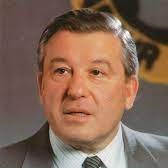

Philip Muscat ( Żebbuġ , 9 August 1930 - Msida, 31 December 2010) was a doctor and Labour Minister in the 1970s and 1980s, and during his time important developments took place for Malta, mainly in the field of telecommunications as well as in that of education, including the establishment of Junior Lyceums.
The son of Joseph and Anna née Sciortino, Philip Muscat studied at Żebbuġ Primary School, the Seminary and the University of Malta from where he graduated with a B.Pharm., B.Sc. in 1952 and became a doctor in 1955. He was a popular doctor in the Zebbuġ and Qormi areas. Dr. Muscat was married to Doris née Cuschieri and they had three children, Alexander, Joseph and Marlene.
Dr. Muscat entered politics in 1956 as president of the Għada Żebbuġ Youth Labor Party. He contested the general elections on behalf of the Labor Party in 1962, 1966 and 1971 and always came out on top of the fifth district. In the 1960s he was the Opposition spokesperson on Social Services and Health. He also successfully contested the 1976, 1981 and 1987 elections in which he was elected from the sixth district. In 1992 he contested from the sixth and seventh districts where he had managed to retain his parliamentary seat after winning a casual election.
Between 1971 and 1976, Dr. Muscat was appointed deputy chairperson of the committees of the House of Representatives, and also led a delegation to the Council of Europe. After the 1976 election, he was given the responsibility of Minister of Education, a position he held until 1983. During his work in this Ministry, he introduced the student worker schemes at the University and the Technical Institute. In 1979, he represented the Prime Minister at the Commonwealth Heads of State Conference in Zambia. Between 1983 and 1987, Dr. Muscat served as Minister of Parastatal Industry, Enemalta and Telemalta. From April 1992, he was the Opposition's chief spokesperson on Employment and the Employment and Training Corporation, until he then retired from politics.
In a statement following his death, the Labor Party said: "Dr Muscat had an excellent career in the field of medicine as well as in politics, where for many years he worked and contributed to the work of the Labor Party, which work he continued to do until the last days."
His funeral was held on 3 January 2011, at the Zebbug Church. Attending were President George Abela, Prime Minister Lawrence Gonzi, Acting Labor Party Leader AnĆglu Farrugia, former Labor Party Leader Alfred Sant as well as current members of parliament and former ministers and deputies who served when Muscat was a minister. In the homily at the mass, Fr Hilary Tagliaferro described Philip Muscat as a balanced man who was capable of self-criticism and called white white and black black. He argued that we must learn from these people and the good they did in their lives we should do the same. He also stressed that authority does not mean power but service to others by those who have power and authority. "Philip used power to give service".
After the mass the coffin was taken out of the church amidst applause from the people and from there it was carried on hands to the front of the Labor club in Zebbuġ where on the facade there was a 'banner' with the words "Thank you Philip". Red and white flowers were thrown from the balcony and the Last Post was played by a group of band members. From there the cortege with relatives and friends continued to the Sacred Heart Cemetery in the same village where Muscat was buried in the family grave.